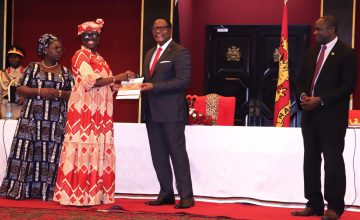Govt revenue down K25.6bn
Treasury has reported a K25.6 billion decline in revenue in October 2018 following a drop in both domestic revenue and grants, figures from the Reserve Bank of Malawi (RBM) have shown.According to a published RBM October 2018 Monthly Economic Report, total government revenues in the month under review amounted to K89.6 billion from K115.2 billion recorded in September 2018. On a year-on-year basis, however, the revenues registered an increase of K8 billion from K81.6 billion realised in October 2017.

RBM figures show that domestic revenue during the month under review declined by K22.4 billion to K82.5 billion from K104.9 billion the month before with tax revenue, non-tax revenue, departmental receipts and other receipts declining to K79.7 billion, K2.8 billion, K2 billion and K0.8 billion from K101.5 billion, K3.4 billion, K2.4 billion and K1 billion, respectively.Grants on the other hand went down by K3.2 billion to K7.1 billion during the month under review from K10.3 billion in September.
“The major grants received in the month of October 2018, were K4.3 billion [$5.8 million] funds from Global Fund for the Ministry of Health, National Aids Commission and K1.2 billion [$1.7 million] from European Union for the Ministry of Finance.
“The remaining K1.6 billion [$2.1 million] were grants towards various government projects. Total foreign inflows, therefore, dropped by K3.2 billion [$4.4 million] from K10.3 billion [$14.0 million] received in September 2018,” reads the report in part.In a published 2018 Economic and Fiscal Policy Statement issued by the Ministry of Finance, Economic Planning and Development, fiscal authorities said over the medium-term, government will be committed to implementing broad-based tax reforms to foster a simple, efficient, transparent and fair tax system.
Through this, government intends to shift from reliance on revenue from taxation of labour and investment (factors of production) to consumption in the medium-term, as it continues to embark on expanding the tax base.Among other things, government intends to leverage the usage of information and communication technologies (ICT) in tax administration and review some user fees and charges while improving efficiency.
But tax consultant Emmanuel Kaluluma earlier said while government is faced with recurring deficits, mostly due to poor revenue collection, widening the tax base would be difficult considering the state of the economy.And speaking during the start of the 2018/19 pre-budget consultation meetings in Blantyre in March, Malawi Confederation of Chambers of Commerce and Industry (MCCCI) private-public partnership manager Hope Chavula asked Treasury to consider reducing and rationing taxes to boost business’ productive capacity.
Earlier, economist Salim Mapila said the cost of extra electricity supply is being borne by the consumers which will affect the profitability of the private sector, hence affecting tax revenue. In the month under review, central government budgetary operations recorded a K23.1 billion deficit compared to a surplus of K3.8 billion recorded in September 2018 with revenues amounting to K89.6 billion against total expenditures of K112.7 billion.





